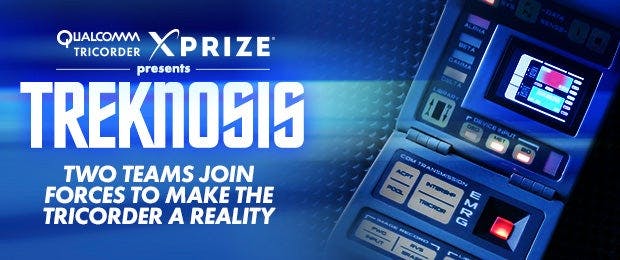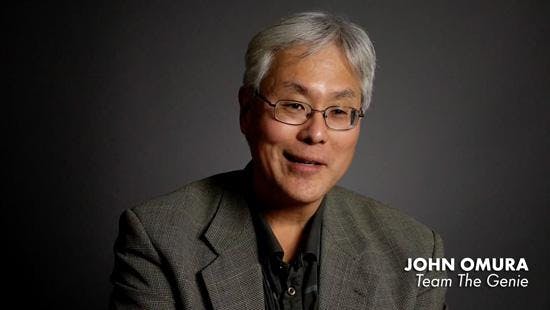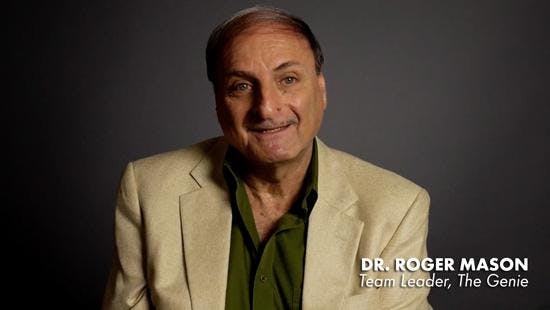Published Aug 11, 2014
Two Teams Join Forces to Make the Tricorder a Reality
Two Teams Join Forces to Make the Tricorder a Reality

Even on Star Trek, there are truths you can't escape: Tribbles and Klingons don't mix. The polarity on nearly anything can be reversed. Never turn your back on a Breen. And a Tricorder is a doctor’s best friend. After all, a doctor is only as good as the data with which he or she has to work.
Maybe a Genie could help? Genie is the brainchild of Dr. Roger Mason, who's joined forces with the Algonquin College team headed up by Professor John Omura to compete in the $10M Qualcomm Tricorder XPRIZE competition. Together, they're melding scanning technology, learning software, and user experience design to create a medical Tricorder device that comes with a built-in diagnostic assistant.

MDs, don't start panicking yet: the Genie doesn't replace the McCoys and Crushers of the world. In fact, it's designed to be the doc’s BFF: something that augments their abilities by narrowing down possibility spaces, helping to make diagnoses and recommend tests and treatments. "We're elevating the average clinician to a master diagnostician," Dr. Mason explains. With the Genie, a junior medical practitioner can optimize his or her process, simplifying pre-screening and making it easy to take a patient's medical history — even flagging things a human might miss. In emerging nations with a scarcity of doctors, the Genie would be even more valuable, enabling community health workers to diagnose conditions and initiate treatments (Star Trek: Voyager’s EMH would be proud!).
This Tricorder concept was Dr. Mason's idea, but after entering the competition, he and his engineering team lead, Cauri Jaye, soon identified a hole that needed filling. "It became clear to Cauri and I that we'd need to work with someone else to incorporate a hardware device that tested vitals and led to diagnoses." They began looking for a team that brought medical sensing and diagnostics to the table, and soon got in touch with the team from Algonquin College, one of the youngest teams competing in the competition. It was a perfect fit, with the Algonquin College team proving to be the peanut butter to Team Genie’s chocolate. On the Genie side: software concepts and know-how, serious medical expertise, and vital project management. On the Algonquin side: strong technical game, an institutional focus on research, and peerless user experience design.

According to Algonquin's Professor John Omura, "It fits the natural model of applied research projects: seeking external partners to collaborate with, we form an R&D team working in collaboration with a client, in this case the Genie." Omura's a strong believer in combining professional experience with student innovation, as he's seen it make for very efficient collaboration. Plus, the XPRIZE competition itself is wildly exciting. "We do it for the students; it's a phenomenal opportunity to participate in a prestigious and exciting global competition, making a groundbreaking advance in healthcare."
Distilled down to its core, their mission is all about optimizing health through democratization — getting people to take control of their own health. "There's a tremendous need in this country, and indeed the world, for people to have a device that will assist them in reaching an accurate diagnosis," Dr. Mason says. This led to the question they asked at the outset, which Jaye sums up as, "How can we take the best possible experience that people have with good doctors and turn that into something they can do on themselves?"
But that's just the first part. As more patients and doctors everywhere use more units, the Genie system gathers data, collating, cross-referencing and learning. Learning things like, for instance, which tests are best for assessing certain conditions, and which ones don't provide accurate or cost-efficient information; did you know unnecessary tests and procedures account for a staggering $700 billion a year by some estimates? This technology will be poised to become a powerful agent in preventing costly testing, instead providing a kind of best-practice medicine that will not only recommend the most accurate test, but the most effective treatment for a given diagnosis. Dr. Mason envisions a world that makes the most of a doctor's time, rewarding the quality of care given, not just quantity. The Genie will be able "to broaden the ability of clinicians and lay people to make diagnoses and understand their health."
Of course, this may change the future as we know it, given the fact that in the 24th century, medical Tricorders weren’t exactly standard issue for the crew. Just think: the emergence of Barclay's Protomorphosis Syndrome on the Enterprise-D could've been avoided entirely if that hypochondriac lieutenant had been able to diagnose the fact that he was totally off his amateur medical rocker!
Jon Sung is a contributing writer for XPRIZE and copywriting gun-for-hire to startups and ventures all over the San Francisco Bay area. When not wrangling words for business or pleasure, he serves as the first officer of the USS Loma Prieta, the hardest-partying Star Trek fan club in San Francisco.
XPRIZE is an innovation engine. We design and operate prize competitions to address global crises and market failures, and incentivize teams around the world to solve them. Currently, we are operating numerous prizes including the $30M Google Lunar XPRIZE, challenging privately funded teams to successfully land a robot on the Moon’s surface, and the $10M Qualcomm Tricorder XPRIZE, challenging teams around the world to create a portable, wireless, Star Trek-inspired medical device that allows you to monitor your health and medical conditions anywhere, anytime. The result? Radical innovation that will help us all live long and prosper.
Sign up today to join our mission, be a part of our campaign and win collectibles at: tricorderfederation.org.





